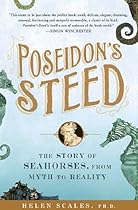Poseidon's Steed: The Story of Seahorses, From Myth to Reality

| Author | : | |
| Rating | : | 4.41 (702 Votes) |
| Asin | : | 1592405819 |
| Format Type | : | paperback |
| Number of Pages | : | 288 Pages |
| Publish Date | : | 2014-03-23 |
| Language | : | English |
DESCRIPTION:
Her doctorate involved searching for giant, endangered fish in Borneo; she's also tagged sharks in California, and once spent a year cataloguing all the marine life she could find surrounding a hundred islands in the Andaman Sea. Helen is now a freelance researcher and broadcaster; she appears regularly on BBC Radio 4, Sky News and the BBC World Service, and has presented documentaries on topics such as whether people will ever live underwater, the science of making and surfing waves and the intricacies of sharks' minds. Spirals in Time is her second book. . About the Author Helen Scales is a marine biologist based in Cambridge, England
Helen Scales is a marine biologist based in Cambridge, England. Spirals in Time is her second book. . Her doctorate involved searching for giant, endangered fish in Borneo; she's also tagged sharks in California, and once spent a year cataloguing all the marine life she could find surrounding a hundred islands in the Andaman Sea. Helen is now a freelan
It is rare to catch a glimpse of a seahorse in its natural habitat. Poseidon?s Steed is a sweeping journey that takes us from the coral reefs and seagrass meadows of Indonesia where many seahorses makes their natural habitat to the back streets of Hong Kong where a thriving black market seahorse trade is concealed. We see them immortalized in the decorative arts; in tribal folklore, literature, and ancient myth; and even on the pages of the earliest medical texts, prescribed to treat everything from skin complaints to baldness to flagging libido. But even if few have seen one live, these exotic, seemingly prehistoric creatures exist quite vividly in our imaginations and they have mesmerized scientists, artists, and storytellers throughout time with their otherworldly rarity. The ancient Greeks called the seahorse hippocampus (half-horse, half-fish) and sent it galloping through the oceans of mythology, pulling the sea god Poseidon?s golden chariot. Throughout history, seahorses have surfaced in some unexpected places and Scales also follows the seahorse back in time, from ou
D. Blankenship said DO GIVE THIS ONE A READ! I promise you that you will not be sorry!. Every so often you are fortunate enough to stumble across a book, purely by accident that is an absolute delight; a pleasurable pause in your life from which simply makes living better. This is one of those works. To be honest, I have never given seahorses much thought. Yes, I have seen their little bodies washed up on beaches around the world, seen pictures, gazed in disgust upon their dried remains in various Asian markets and gross little souvenir stands near our own now polluted gulf but never actually gave them much thought one way or the other. Hard to Believe It's Not a Myth Rob Hardy Probably you have never seen a seahorse in the wild. Even Dr. Helen Scales, who is a scuba diver and marine biologist, has only seen them a few times. The first one she saw, after many dives of looking, was "like glimpsing a unicorn trotting through my garden." But everyone knows what a seahorse looks like, a fantastic looking creature that sparks curiosity, and it is a hit at aquariums or in oceanic picture books. Scales has satisfied many facets of the curiosity about seahorses in her book _Poseidon's Steed: The Story of Seahorses, from Myth to Re. A Look into the Precarious World of the Seahorse Poseidon's Steed is a fascinating introduction into the world of the seahorse, explaining the historical significance of these iconic creatures, and accurately depicting their uncertain future as a result of human consumption for the traditional medicine trade. Dr. Helen Scales spans the globe, collecting myths and legends of the seahorse from many different cultures and time periods, to explain how these relatively unassuming creatures have remained so culturally and spiritually important to the modern world. An importance which, ironically, threat
